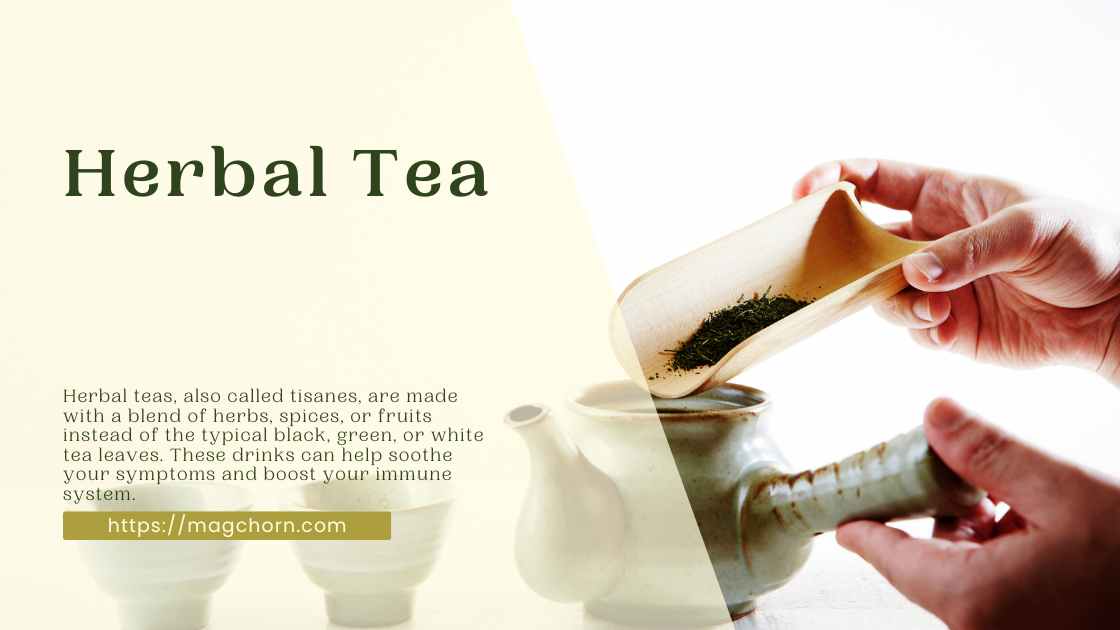Herbal teas, also called tisanes, are made with a blend of herbs, spices, or fruits instead of the typical black, green, or white tea leaves. These drinks can help soothe your symptoms and boost your immune system.
In a time where antibiotic resistance is increasing, herbal teas can be used as a natural alternative for treating infections. Some teas have even shown bactericidal activities when used in combination with antibiotics.
Peppermint
Peppermint tea is more than just a palate cleanser. This natural herb has cooling properties that can soothe the throat and ease coughing. It also has digestive benefits such as soothing constipation and easing indigestion. Its minty taste comes from menthol, an essential oil that also gives it its cooling scent when massaged into the skin or inhaled via a vaporizer or spray.
Peppermint leaves contain several beneficial chemicals that can help a wide variety of health problems, including irritable bowel syndrome and tension headaches. The plant also contains the natural compounds menthone and limonene, which may help reduce stress and anxiety. These properties are used in aromatherapy to treat many mental health issues, including enhancing memory and increasing alertness.
Another herbal ingredient that is a powerful aid in fighting off illnesses is ginger root, a powerful anti-inflammatory and antioxidant with natural pain-relieving properties. It is often paired with other healing herbs and spices in flavored herbal teas to create a tea that can help fight the common cold, reduce nausea, indigestion, and more.
Lemon is a great source of vitamin C, which can help boost the immune system and speed up recovery from illness. It is a popular ingredient in tea blends like our Santa Fe opera singer’s tea, Sing Your Song, where calming lavender blossoms and cooling peppermint make for an infusion that is perfect to keep your voice in tip-top shape while sick.
Chamomile
Chamomile is one of the most popular herbs used for making herbal tea. The flowering herb is also found in topical preparations and cosmetics. Chamomile has been used for centuries, with evidence of its use dating back to ancient Egypt, Greece and Rome, per the National Center for Complementary and Integrative Health (NCCIH).
Its most well-known benefits are stress relief and sleep aids. Chamomile’s vapors have been shown to act as a mild sedative, calming the nerves by blocking receptors that send anxiety-provoking signals to the brain.
Research has also indicated that chamomile can help ease common cold symptoms and prevent headaches. Its anti-inflammatory properties have been found to reduce inflammation in the throat and nose, helping relieve congestion. Various studies have also indicated that chamomile may be a natural cancer treatment, thanks to its antioxidants, which inhibit the growth of cancerous cells.
Its mellowing effects make it a good choice for women who suffer from vaginitis, as it helps ease pain and irritation. It can also be helpful to calm stomach spasms, according to research in preclinical models. However, chamomile is not recommended for people who are taking blood-thinner medications or those with diabetes, as it has some blood-thinning properties. It is also important to talk to your healthcare providers about complementary health approaches and any specific concerns you might have.
Hibiscus
A cup of hibiscus tea can give your immune system a boost thanks to its vitamin C content. As a potent antioxidant, vitamin C can help your body fight off infections from viruses and bacteria. It also helps your body absorb iron, which is especially important for women who are pregnant or breastfeeding.
This tropical plant, which is often found soaking up the sun in far-flung locales, is best known for its gorgeous trumpet-shaped flowers that are used to make herbal tea. Scientifically named Hibiscus sabdariffa or roselle, it has many other names around the world including bissap in parts of West Africa; karkade in North Africa, Egypt, and Sudan; rosela, zobo, or grosella in Indonesia and Australia; chaya in Thailand and northeastern India; kheera in India; luo shen hua in China; and flor de Jamaica in Mexico and across the Caribbean.
The hibiscus plant is packed with polyphenols, which are powerful antioxidants that help prevent oxidation of other nutrients. This reduces the risk of heart disease and cancer, lowers cholesterol levels, and improves your overall health.
As with any dietary supplement, it’s best to speak to your doctor before you start drinking hibiscus tea. It’s possible that this herb may interact with certain medications or cause side effects, so it’s a good idea to get medical advice from your ayurvedic physician before you make any changes to your diet.
Green Tea
Green tea packs a serious punch when it comes to health-boosting antioxidants. It has been used as a medicinal drink for centuries, and its effectiveness has been proven in numerous studies. It’s a natural diuretic and astringent, which help remove excess fluid from the body and control bleeding. It has also been used to reduce high blood pressure and improve heart health. Population-based studies show that frequent tea consumption may protect against atherosclerosis and other cardiovascular diseases.
It’s important to note that the bioactive properties of tea can vary depending on the brand and preparation. Adding milk or sugar can alter the benefits of herbal teas as well. In addition, specific herbs have different safety ratings and it’s important to discuss consuming them with your doctor, especially if you are pregnant or breastfeeding.
Herbal teas are packed with functional ingredients like fennel, ginger and eucalyptus that have anti-inflammatory properties, helping relieve symptoms of gastrointestinal distress, arthritis and headaches. Some herbal teas are known to assist in weight loss, with ingredients such as psyllium husk and fennel aiding in detoxifying the digestive system, improving metabolism and burning fat. Other ingredients, like turmeric and stinging nettle, have been shown to help with inflammation and autoimmune disorders. The best way to choose the right tea is by knowing your needs and selecting a blend with ingredients that will meet them.
